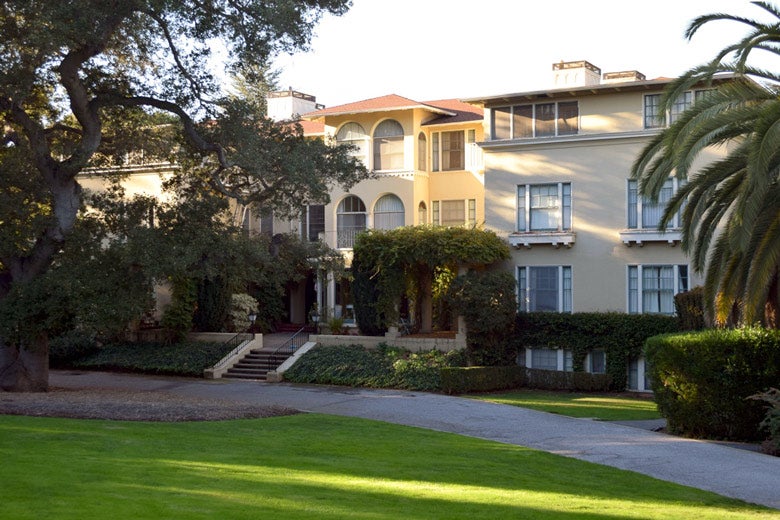
The Kingscote Gardens building, constructed in 1917, will undergo renovations to primarily accommodate student services offices and to bring it up-to-date with seismic and code requirements. (Image credit: Kate Chesley)
The historic Kingscote Gardens building will soon undergo renovations to primarily provide a centrally located space for students to seek services and support from student affairs professionals.
Kingscote Gardens, constructed in 1917, is located off Lagunita Drive between the Faculty Club and Harmony House. Surrounded by lush grounds, it features an English-style garden. The building has been used as an apartment building by faculty, staff, students and alumni.
The building will undergo much-needed interior and infrastructure work to bring it up-to-date with seismic and code requirements. As part of the year-long renovation, the building will be converted into office space.
Among the offices projected to occupy the building sometime in 2017 are Counseling and Psychological Services, the Confidential Support Team, the Title IX Office, the Office of Sexual Assault and Relationship Abuse Education and Response, the Sexual Harassment Policy Office, the Diversity and Access Office and the Office of the Ombuds. The building will also house the Faculty and Staff Help Center.
“We’re very pleased to have the opportunity to bring these offices together in a space that allows for collaboration and cooperation,” said Greg Boardman, vice provost for student affairs. “Offices involved in response to sexual assault and Title IX concerns have a vital role to play for students at Stanford. The functioning of all of these offices will be enhanced considerably by being located in the same space. In addition, Kingscote Gardens is a perfect place for students to seek services. It is centrally located, set back from the road, very quiet and surrounded by attractive landscaping. It offers a sense of tranquility on our otherwise bustling campus.”
According to Marshall Wheel, project engineer in Lands, Buildings and Real Estate, a special focus of the renovation will be the construction of offices where private and sensitive conversations can occur. Other upgrades will include a front entrance ramp for compliance with the Americans with Disabilities Act and development of the basement to allow for offices.
“The conversion of the building provides the opportunity to consolidate programs that provide services – many of them confidential – for faculty, staff and students, including counseling, diversity and ADA compliance, and dispute resolution,” he said.
Since June, the university has been working to assist residents with relocation by providing financial assistance based on the number of years they have lived at Kingscote Gardens, as well as rent rebates and temporary storage facilities.
“We’ve done a lot of outreach with the occupants, most of whom have already moved or made other housing arrangements,” said Leonie Batkin, managing director of asset management in Land, Buildings and Real Estate. “We want to be very respectful of the needs of the residents, and we’ll continue to work as hard as we can to ease this transition for them.”
A recent Stanford magazine article referred to Kingscote Gardens as “Stanford’s own mystery house.” The article highlighted its establishment initially as a place to house visiting professors and other affiliates.
Kingscote Gardens, the article also noted, was highlighted by Robert Harrison, the Rosina Pierotti Professor of Italian Literature, in his book. Gardens: An Essay on the Human Condition. He wrote, “Once you step into it you get a sense that you are in the quietly palpitating heart of the university and that everything somehow radiates out from here.”